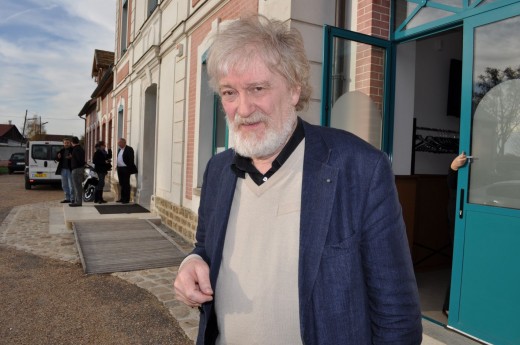The coming year should bring more Châteaureynaud to his American fans—newly translated stories in at least two anthologies—and I should finally be finishing the novel follow-up to the 2010 story collection. Meanwhile, in a review at that clearinghouse of all translated lit, Three Percent, Catherine Bailey has these kind words for A Life on Paper:
Like those master storytellers whose haunting tales were exaggerated by the play of their hands over the flame, Châteaureynaud makes expert thematic use of both light and shadow to reveal his fantastical realms of wonder and fear. His unassuming prose startles as it entrances, holding readers on the edge of elegantly rendered, fantastical dream-worlds while all at once alluding to their more nightmarish qualities. In the style of Kafka and Poe, Châteaureynaud makes the supernatural seem not only present, but ubiquitous, inclined to encroach at any moment on the humdrum lives of unsuspecting mortals. More sinister than fairy tales, yet not quite definable as horror stories, Châteaureynaud’s whimsical writings leave one unsettled and alert, appreciating anew the possibilities of the chilly night air while simultaneously feeling the urge to draw nearer to the fire—just in case…
The border between fantasy and obsession in these stories is never fixed, and some of the humans in Châteaureynaud’s fiction rival his ghosts, goblins, and spooks in their ability to make a reader shiver.
Perhaps it is for that reason that some of the most successful stories in this collection—a sampling chosen from other 30 years of Châteaureynaud’s work—focus not on the mysteries of the supernatural, which the author never seeks to rationalize, but on the intricacies of his human subjects. Whether taken metaphorically or literally, the vignettes in which mystical interludes catalyze or coincide with poignant emotional development in lead protagonists are some of Châteaureynaud’s richest and most memorable.
In case you missed it, Levi Stahl offers up a trenchant appreciation of Châteaureynaud’s short-short “A Citizen Speaks,†which opens the collection.
It’s a lesson in concision, in the way that allowing a voice to speak to the reader as if we already share a substantial amount of underlying knowledge of his world can allow a writer to cut right to the uncanny details of that world; the flat, matter-of-fact tone that results only emphasizes the strangeness of the situation being revealed. Dread edging into horror in two pages—that’s an achievement.
I’d love to hear his take on the rest of the book.

Leave a Reply